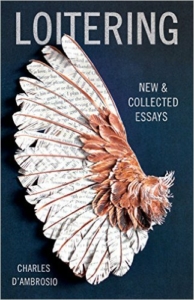Writers Read: Loitering by Charles D’Ambrosio
 I read the essay collection Loitering by Charles D’Ambrosio, and returned to my own work-in-progress that suddenly resembled the cute chicken scratch of a toddler. Or an actual chicken. I looked at my attempt at an essay and thought, surely there’s a mistake. This can’t be my most recently revised draft. Alas. And so D’Ambrosio’s work has had the dual effects of plunging me into depression over my own ineptitude and also making me a keener editor of my work. That is, I will be a keener editor just as soon as I climb out of this depressed funk.
I read the essay collection Loitering by Charles D’Ambrosio, and returned to my own work-in-progress that suddenly resembled the cute chicken scratch of a toddler. Or an actual chicken. I looked at my attempt at an essay and thought, surely there’s a mistake. This can’t be my most recently revised draft. Alas. And so D’Ambrosio’s work has had the dual effects of plunging me into depression over my own ineptitude and also making me a keener editor of my work. That is, I will be a keener editor just as soon as I climb out of this depressed funk.
I know it’s not fair to make the comparison. It’s just that every time I read an essay I admire these days, I wonder, will I ever approach any level of mastery? The answer is always no, but I never stop asking the stupid question. Maybe it’s a function of grad school. Maybe after I am finished with this program, I will return to enjoying great books without shivering in their shadows. Here’s hoping. And also, Charles D’Ambrosio would likely inveigh against the very concept of mastery.
I am being melodramatic. So I’m going to discuss something useful, like what it is that makes this book so transcendent. Each essay deserves its own annotation.
There is, firstly, the author’s command of language. I don’t use the word command lightly; he seems to have at his fingertips a more complete dictionary than the rest of the English speakers I know. His tone is witty and conversational, with attention paid to musicality. He can use words like preambular and prolepsis in the same paragraph and no one is irritated. (This reader was, admittedly, delighted by evident devotion to the mot juste, even when it had me consulting a glossary about once every page. This reader was even moved to use the pretentious term mot juste in an annotation.)
He is skeptical of all that is glib or pat, and all the while he is mercilessly critical when it comes to his own authority.
The title of the collection is an example of the author’s near-perfect diction. Loitering is exactly what D’Ambrosio gives the impression of doing on these pages, in the sense of lingering on the margins of situations and arguments for prolonged periods of time, paying attention and gathering observations. (An essay about a SWAT standoff is not about ostensible criminal activity, but about turning toward what the cameras aren’t pointed at—the city full of poverty and displacement; a piece about anti-whaling activists and native cultures who still hunt whales reveals arguments full of discrepancy and hypocrisy; an essay about observing the trial of Mary Kay Letourneau becomes an essay about the moralizers who wrote essays and opinions about the trial, and so on.) And loss is everywhere, handled with excruciating attention, loss of one brother to suicide, another to mental illness, and the big empty space—another type of loss—that exists in place of a relationship between the author and his father.

For all that these essays are authoritative, offering deep insights in intricate and innovative terms, the abiding theme is doubt. It runs like a seam through each essay, even when the author is making impenetrably sound points. It is as if he insists upon the fact of doubt above all else; it underlies his every assertion, whether through punch lines and self-deprecation or by perforation of axioms (his or anyone’s). D’Ambrosio reveals his powerful analytical mind on every page. Each essay’s subject has been considered inside and out, turned over, tasted, weighed, and still the author’s lingering questions about a given subject are what stand out. This is his particular strength. He can look uncertainty squarely in the face, he probes for what might have been missed in a given argument. This is a ballsy—and instructive—move for an essayist. He is skeptical of all that is glib or pat, and all the while he is mercilessly critical when it comes to his own authority. He expresses deep personal sadness in many of the pieces (via tone and subject matter), and maybe being that low is what allows him to explore the dark so fearlessly. He was already depressed, so it was only a stone’s throw to a space that he might ably call “chthonic”.
By giving a broad berth to uncertainty, D’Ambrosio also makes room for connection with his reader. In his preface, he asks, “Are we—the hesitant, the conflicted—all alone?” In contrast to essays which strive to be conclusive, the work in Loitering offers doubt like an open door. The collection even obliquely suggests that connections can be forged among the askers of questions, humanity (maybe love) is in lacunae and liminal space.


 Mary Birnbaum is the Lunch Ticket blog editor and translation genre editor. She studies creative nonfiction in the Antioch LA MFA Program. She resides in Orange County, California. You can find her on Twitter and Instagram @ailishbirnbaum.
Mary Birnbaum is the Lunch Ticket blog editor and translation genre editor. She studies creative nonfiction in the Antioch LA MFA Program. She resides in Orange County, California. You can find her on Twitter and Instagram @ailishbirnbaum.


